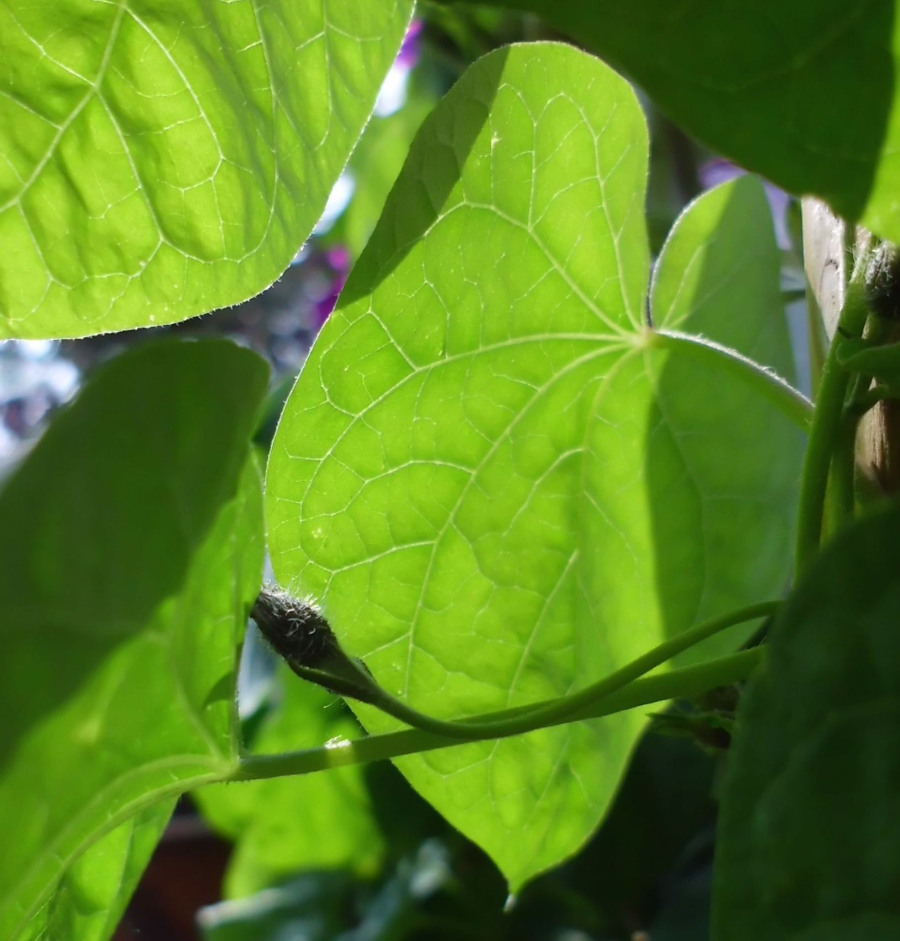
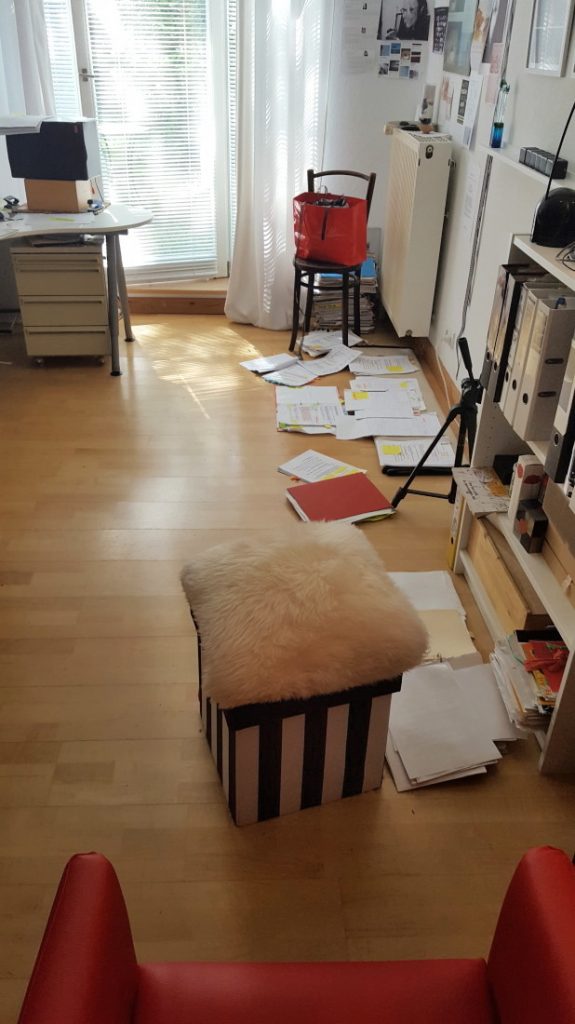
Papierlos – Paperless
Eigentlich arbeite ich papierlos, ja wirklich, ich drucke kaum noch was. Aber in der Endphase der Produktion sieht es dann doch immer wieder so aus. Da auf dem Boden liegen vor allem Skriptfassungen. Die letzten drei muss ich einfach auf Papier lesen und Haftzettel anbringen können und Reiter. Mein analoges System ist effektiv. Ich hab noch nicht versucht, es in WORD anzuwenden. Vielleicht ginge es, aber das auszutüfteln habe ich keine Geduld.
Actually I work paperless, really, I hardly print anything anymore. But when I’m in the final production phase, it always looks like this. What you can see lying on the floor are mainly script printouts. I just need to be able to read the last three versions on paper and stick on sticky notes and tabs. My analog system is effective. I haven’t tried it in WORD yet. Maybe it would work but I have no patience to figure that out.
Radiofeature – was ist das eigentlich?
Vor Covid-19, als wir uns noch in Räumen mit vielen Leuten trafen und es zu dem berühmten „Und was machst du so“ kam, wurde ich manchmal gefragt, was denn ein Radiofeature eigentlich ist. Oh bitte nicht, hab ich gedacht, weil ich wusste, dass ich auch diesmal keine kurze präzise Erklärung hinbekomme. Ich schwummerte so herum: „Feature ist keine Dokumentation, auch wenn es Original-Töne verwendet. Es ist auch keine Fiktion, obwohl es Hörspielszenen verwenden kann, usw., usw.
Und jetzt? Was ist jetzt meine kürzestmögliche Erklärung? –
Ich versuch’s:
Das Genre Radiofeature spielt mit allen Radioformen, kann alle beinhalten, ob Reportage, Hörspiel und anderes Fiktive, Monolog, Dialog, Erzähltext … Alles ist möglich. Und darum mag ich es.
A radio feature – what is it actually?
Before Covid-19, when we still met in rooms with lots of people asking each other: „So what do you do for a living“, some people followed-up: „What actually is a radio feature?“ Oh dear, I knew, I wouldn’t be able to briefly and precisely describe it this time either. I stuttered around kind of like: „A feature is not a documentary even it uses original sounds. It is also not fiction even if it can use radio play scenes etc. etc.
And now, what is my explanation, as short as possible? I’ll try:
The radio feature genre plays with all forms of radio, can include all, be it reportage, radio play and oder fictional things, monologue, dialogue, narrative text … Everything’s possible. And that’s why I like it.
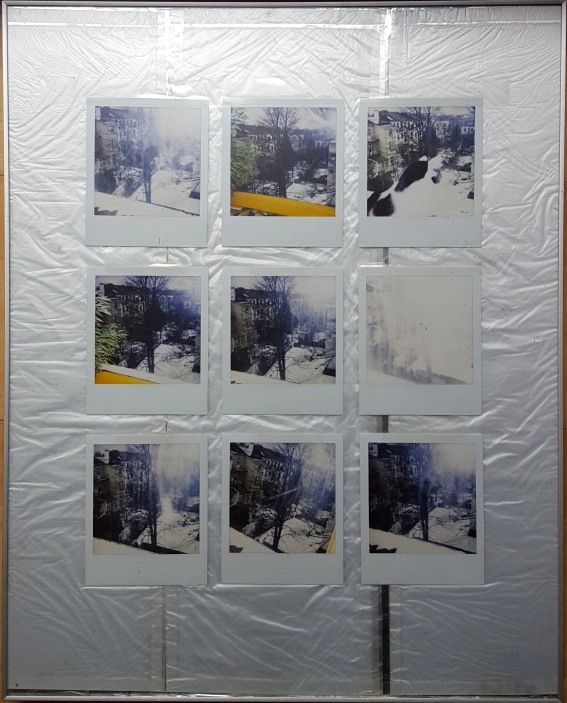
Du extrahierst Momente aus dem, was dir die Mitwirkenden erzählen über Geschehenes. Oder Du extrahierst gegenwärtige Momente der Mitwirkenden, in denen etwas geschieht. Du arrangierst sie mit Geräuschen, Hintergründen, Musik, Sounddesign. Du 'rahmst' sie, gewissermaßen.
You extract moments from what contributors tell you about what happened. Or you extract present moments of the contributors when something is happening. You arrange it with noises, backgrounds, music, sound design. You 'frame' it in a way.
Ich wurde so einiges gefragt zur Machart des Radiofeatures „Während meine Kunden schlafen“ und ich möchte die Fragen gern hier beantworten.
I have been asked a few things about my approach to the radio feature „While my clients are asleep“, and I would like to answer these question now.
Skype-Gespräche als Ausgangsmaterial /
Skype talks as source material
Ist es schwerer für dich, Skype-Gespräche zu führen anstatt im selben Raum jemandem gegenüberzusitzen?
Nein, überhaupt nicht. Dazu muss ich sagen – und das sage ich auch in diesem Feature – wir hatten alle die Computerkameras aus und hörten uns nur. Ich mag es sehr, wirklich sehr, mich ausschließlich auf die Stimme zu konzentrieren, besonders, wenn die Person in diesen Momenten auf der anderen Seite der Welt ist. Ich finde, dabei kann genauso eine gewisse Nähe, ein Vertrauen und Authentizität aufkommen als säßen wir im selben Raum miteinander. Ich habe sogar das Gefühl mitunter, dass ich bei diesen digitalen Gesprächen näher bei einer Person bin.
Is it harder for you to have a Skype-conversation instead of talking face to face in the same room?
No, not at all. Let me just say one thing -I also mention it in the radio piece – our computer cameras were off, we just heard each other. I really like to focus solely on the voice, especially if the person is on the other side of the world at these moments. I think, during these „remote conversations“ a certain closeness, trust and authenticity can develop just as much as if we were sitting together in the same room. Sometimes I feel that I am even closer to a person during the digital conversations.
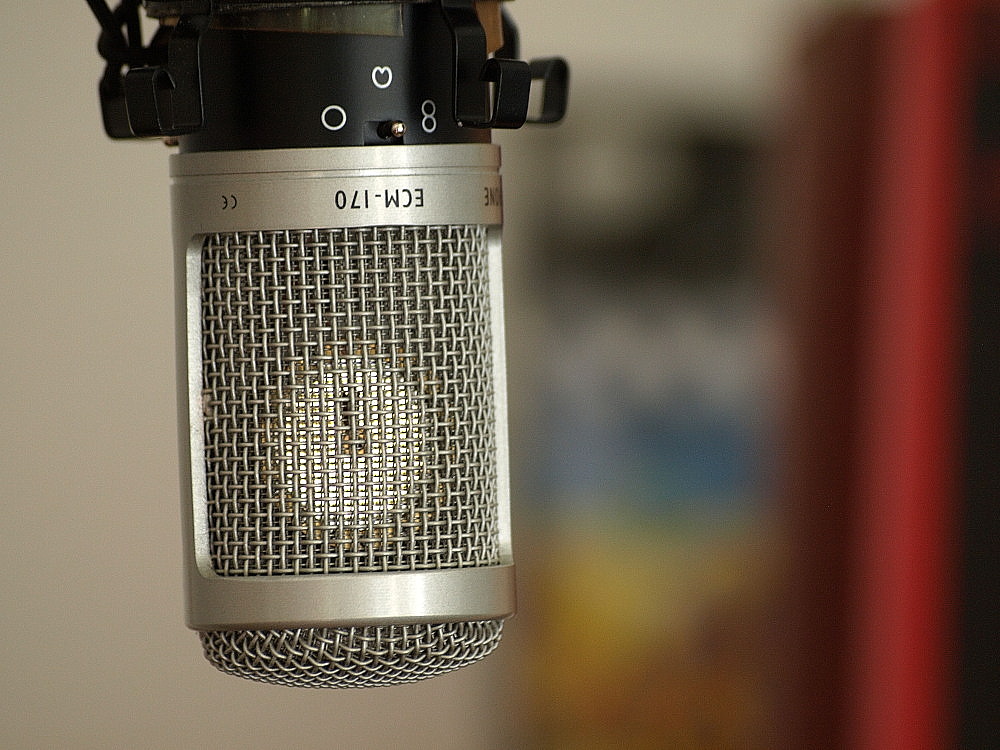
‚Ferngespräche‘
‚Remote talks‘
Wo waren die Mitwirkenden bei den Aufnahmen? /
Where were the contributors during the recordings?
Sie waren in Wohnungen, AirB&Bs. Rein theoretisch könnten sie ja überall skypen, sogar in der Fahrrad-Rikscha, während sie durch Hanoi sausen. Das kann sich ganz toll anhören, aber nur für kurze Zeit, 10-15 Sekunden, und dann nervt ja der Lärm, sowohl im Radiostück als auch während der Skype-Gespräche. Also befanden sich die Mitwirkenden alle in leisen Räumen. So bin ich dann auch in der Tongestaltung flexibel. Ich kann nachträglich einen Hintergrund einfügen und auch den räumlichen Abstand zwischen Stimme und Hintergrund variieren.
They were in apartments, AirB&Bs. Theoretically, participants could skype anywhere, even in a cycle rickshaw while they whiz through Hanoi. It can sound great, but only for a short time, 10-15 seconds, and then it’s just too loud, it’s annoying in the radio piece and also during Skype talks. So the participants were in quiet rooms. That way I am flexible when designing the sound. I can add a background sound afterwards and I can also vary the spatial distance between the voice and the background.
Und woher kommen die Hintergrundgeräusche, die wir im Feature hören können?
And were does the background noise come from that we can hear in the radio feature?
Na ja, die Hintergrundgeräusche kommen aus meinem Archiv, also jedenfalls die Hintergrundgeräusche der Gespräche. Ich war selbst vor ein paar Jahren in diesen Ländern und habe dort Aufnahmen gemacht. Die verwenden zu können war sehr erleichternd für mich, denn ich musste nicht stundenlang Atmosphären suchen und sie kaufen.
Bei den Sprachnachrichten sind die Hintergründe meist authentisch, wie zum Beispiel in Sonias Voice Memo im Hagelsturm in Ecuador. Das hat Sonia toll gemacht, der Hagelsturm war ja richtig laut, aber man hört ihre Stimme trotzdem gut. Es ist nicht ganz einfach, so was mit dem Smartphone aufzunehmen.
Well, I took background noise from my archive, at least for the conversation parts. I traveled to these countries myself a few years ago and made recordings there. It was a great relieve for me to have them. So I didn’t have to search for atmospheres for hours and buy them.
The background noise of the voice memos is mostly authentic, like in Sonias voice memo in the hailstorm in Ecuador. Sonia did a great job, the hailstorm was really loud but you can still hear Sonias voice very well. It’s not that easy to record these things with a smartphone.
Was war das Schwierigste für dich bei diesem Radiofeature?
What was the hardest part for you with this radio feature?
Die vier Mitwirkenden zu finden. Ich habe ein halbes Jahr dazu gebraucht, das hat echt Nerven gekostet. Ich wollte ja digitale Nomadinnen und Nomaden finden mit sehr unterschiedlichen beruflichen Tätigkeiten. Sonia ist Online-Psychologin, Kyle Reisefilmmacher, Eva Marketing-Texterin und Daniel, spezialisiert auf Sportmarketing, optimiert die Internetpräsenz seiner Kunden. Ich wollte zwei Frauen und zwei Männer finden. Und zwei Mitwirkende sollten schon etwas länger das digitale Nomadenleben führen als die anderen beiden. Zur Zeit der Featureproduktion machte Sonia es schon vier Jahre, Daniel auch, und Eva und Kyle waren erst halb so lang dabei und mussten die für sie beste Herangehensweise erst finden. Es ist natürlich attraktiv, verschiedene Perspektiven zu hören, aber es macht halt Arbeit.
Find the four contributors. It took me half a year to do this. Quite nerve-wracking. I wanted to find digital nomads whose jobs or skills are very different. Sonia is an online psychologist, Kyle a travel filmmaker, Eva is a marketing copywriter and Daniel who specializes in sports marketing optimizes his customer’s internet presence. I wanted to find two women and two men. And two contributors should have been living the digital nomad life a little longer. Sonia had been doing it for four years when we started the recordings and had quite a reliable income, as was Daniel, and Eva and Kyle had been digital nomads for half as long and first had to find the best approach to this lifestyle for then. It’s attractive, of course, to listen to different perspectives, but it’s extra work.
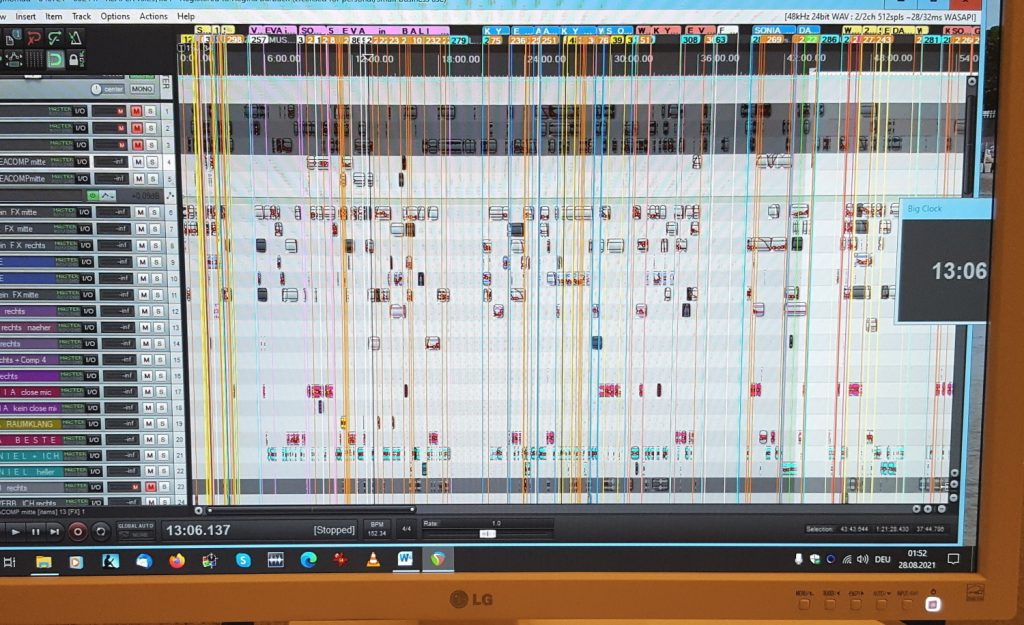
Was sonst noch?
What else?
Eines ist immer schwierig: Die Gnadenlosigkeit des Sendezeitlimits und wenn im Soundprogramm auf meinem Bildschirm die Geschichte Form annimmt und ich merke, eine Sequenz wird zu lang und ich muss eine von zwei gleichguten, wunderbaren Erzählpassagen rausnehmen. Ich höre mir die beiden zehn Mal an, bevor ich auf DELETE drücke.
Und ganz furchtbar finde ich es, kurz vor Fertigstellung eines Radiostücks zu merken, ich bin zu lang, und dann dieses „Kill-your-darlings“ betreiben zu müssen, wenn das ganze Stück sowieso nur noch aus allerliebsten Darlings besteht. Zum Glück passiert mir das nur noch selten.
Wie entscheidest du, was du rausnimmst?
Erst einmal kann es ja sein, dass die beiden scheinbar gleichguten Passagen gar nicht gleichgut sind und ich mich irre. Ich höre mir beide also wieder und wieder an und prüfe, wie intensiv sie wirken. Das Intensivste bleibt drin.
Die Intensität des Gesagten, abgesehen vom Inhalt, hängt ja von so vielem ab, alle spüren das, also, wie ehrlich die Stimme klingt, inwieweit sie Gefühle zeigt. Drei Worte können viel intensiver sein als ein Dutzend.
One thing is always difficult and that is the mercilessness of the airtime limit and when the story takes on form in the sound program on my screen and I notice that a sequence is getting too long and I have to take out one of equally good, wonderful narrative sequences. I play both of them ten times before hitting DELETE.
And I find it particularly terrible when I notice shortly before the completion of a radio piece that I’m too long and have to do this „kill-your-darlings“-thing, now that the whole piece consists only of the very dearest darlings anyway. Fortunately, that doesn’t happen very often to me anymore.
How do you decide what to take out?
Well, maybe I’m wrong and the passages that seem to be equally good are not really equally good. So I listen to both of them over and over in order to feel how intense they are. The most intense remains.
Intensity of what is said, apart from content, depends on so much, and everyone feels that, i.e. how honest the voice sounds, to what extend it shows feelings. Three words can be much more intense than a dozen.
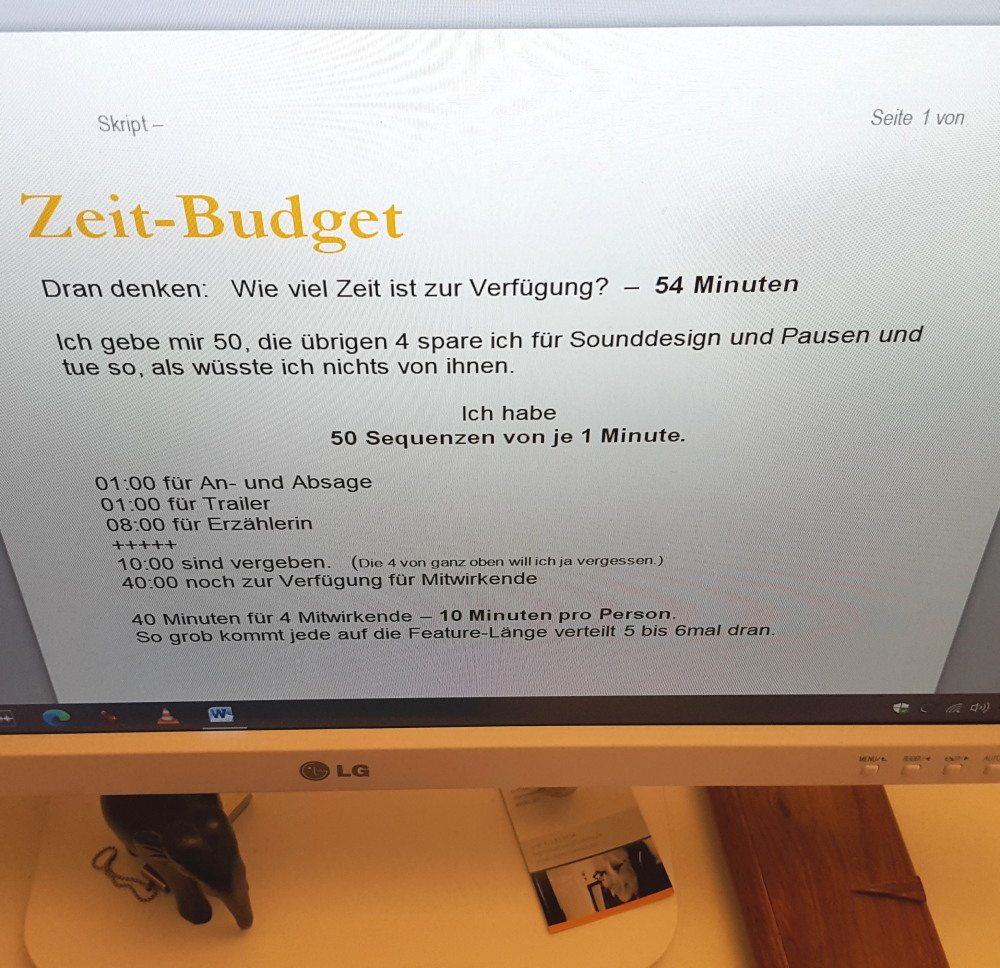
So sieht die erste Seite aller meiner Skripte aus. Damit ich mich nicht verzettele. 40 Minuten für 4 Personen. 10 Minuten pro Person. Das ist nicht viel, aber genug, um das Publikum zu langweilen. Also: Erfreue das Publikum!
This is what the first page of each of my scripts looks like. So that I don't get bogged down. 40 minutes for 4 persons. 10 minutes per person. It's not much, but it's enough to bore the audience. So, delight the audience!